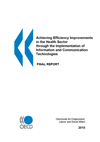
Within the OECD Secretariat, this report was developed by Elettra Ronchi who acted as project manager and principal author, and by M. Saad Khan who provided key contributions. The report, in its various iterations, benefited from comments and suggestions from Martine Durand, Mark Pearson, Gaetan LaFortune, Howard Oxley, Francesca Colombo, Elizabeth Docteur, Peter Scherer, Graham Vickery and the project's Expert Group, which included representatives from OECD member countries, the European Commission, the World Health Organisation, and the Business and Industry Advisory Committee to the OECD (BIAC). The Expert Group provided technical input and feedback on the work at three meetings convened during the course of the project. An additional expert meeting was organised by the BIAC at OECD Headquarters in 2007 under the OECD Labour Management Programme.
The authors would like to express particular thanks to country experts who aided in the implementation of case studies, and those members of national administrations who took the time to help the Secretariat. In particular, special thanks go to Hans Haveman and Barend Hofman (Netherlands); Christine Labaty, Nancy Milroy-Swainson, Joseph Mendez and Liz Waldner (Canada); Kerry Burden and David Glance (Australia); Ashish Jha, Blackford Middleton, Micky Tripathi, David Bates, Charles Friedman, Yael Harris, Rachel Nelson, Jenny Harvell (United States); Javier Carnicaero, Oscar Ezinmo, Luis Alegre Latorre, Luis Manzanero Organero and Josep Pomar Reynés (Spain); Daniel Forslund, Enock Ongwae, Gunnel Bridell, and Bengt Åstrand (Sweden); Paivi Hamalainen (Finland); Kristian Skauli (Norway); Erwin Bartels (Germany). Bill Pattinson (Australia) assisted the Secretariat as outside expert consultant on background work for the part on monitoring and benchmarking. Secretarial and administrative support was received from Aidan Curran, Heike-Daniela Herzog, Elma Lopes and Isabelle Vallard.
Thanks are also due to those member countries who supported this project with voluntary contributions: Australia, Canada, Finland, Germany, the Netherlands, and Spain.
This project was co-financed by a grant provided by the Directorate General for Health and Consumers of the European Commission.
Download Achieving Efficiency Improvements in the Health Sector through the Implementation of Information and Communication Technologies (.pdf, 1.172 KB).
Download from eHealthNews.eu Portal's mirror: Achieving Efficiency Improvements in the Health Sector through the Implementation of Information and Communication Technologies (.pdf, 1.172 KB).